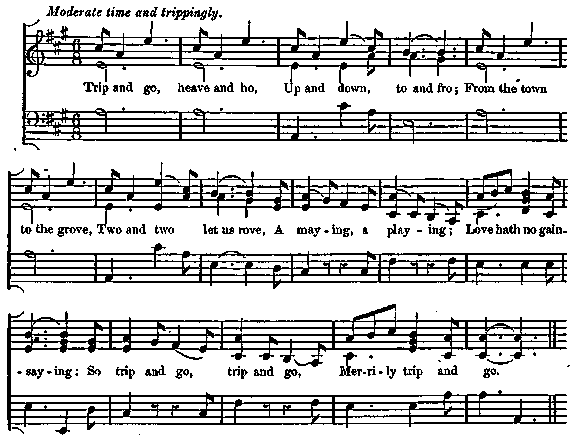Popular Music Of The Olden Time Vol 1
Ancient Songs, Ballads, & Dance Tunes, Sheet Music & Lyrics - online book
| Share page | Visit Us On FB |
|
REIGN OF ELIZABETH. |
131 |
||
|
upon his back. You, friend, with the hobby-horse, go not too fast, for fear of wearing out my lord's tile-stones with your hob-nails."
Ver.—" So, so, so ; trot the ring twice over, and away." After this, three clowns and three maids enter, dancing, and singing the song which is here printed with the music.
Trip and go seems to have become a proverbial expression. In Gosson's Schoole of Abuse, 1579: " Trip and go, for I dare not tarry." In The two angrie Women of Abington, 1599: " Nay, then, trip and go." In Ben Jonson's Case is altered: " 0 delicate trip and go." And in Shakespeare's Love's Labour Lost: " Trip and go, my sweet."
The tune is taken from Mustek's Delight on the Cithren, 1666. It resembles another tune, called The Boatman. (See Index.) |
|||
|
|
|||
 |
|||
|
|
|||
|
The Morris-dance 'was sometimes performed by itself, but was much more frequently joined to processions and pageants, especially to those appointed for the celebration of May-day, and the games of Robin Hood. The festival, instituted in honour of Kobin Hood, was usually solemnized on <the first and succeeding days of May, and owes its original establishment to the cultivation and improvement of the manly exercise of archery, which was not, in former times, practised merely for the sake of amusement.
" I find," says Stow, " that in the month of May, the citizens of London, of all estates, lightly in every parish, or sometimes two or three parishes joining together, had their several Mayings, and did fetch in May-poles, with divers warlike shetvs, with good archers, Morris-dancers, and other devices for pastime all |
|||